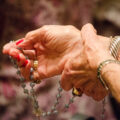Millennials and the New Age – religion or not?
Millennials and the New Age – religion or not?
Angel therapy, witchcraft, and energy healing are gaining popularity among millennials. But is the New Age at odds with traditional religions?
Spiritual, not religious
More and more people believe in, practice, or identify themselves with the New Age movement. This is an umbrella concept for numerous spiritual cultures including, for example, astrology, meditation, energy healing, crystals, tarot, angel therapy, and witchcraft.[1] [2] [3] New Age is especially popular among millennials[4] who prefer to define themselves ‘spiritual’ rather than ‘religious’.[5] [6] [7] In fact, a study conducted in Finland in 2020 exposes that ¼ of people under 39 years believed in mediums that can intermediate messages between the physical and spiritual worlds, whereas only 10% of over 70-years-olds believed in them.[8] Furthermore, millennials are also more prone to believe in alternative therapies as well as invisible worlds and creatures than older generations.[9]
The influence of Harry Potter
Millennials have grown up by reading and watching fantasy, such as Harry Potter, the Matrix, and Twilight.[10] They have collected Pokémon cards and played video games that familiarise themselves with imaginary worlds.[11] Therefore, popular culture might have accelerated the wake of new forms of spirituality.[12] However, another crucial factor is individualisation. Millennials want to find their own path, define their own identity, and make their own decisions in relation to religiosity.[13] [14] Organised religions feel restrictive for many as, for example, ancestral ways of healing are often interpreted as ‘sin’ within the church rather than possible ways to find peace and harmony, or practice self-examination.[15] [16] [17]
From churches to social media
Traditional churches and institutional religiosity seem unable to offer the same purpose and meaning to millennials as to previous generations.[18] Even though millennials do not affiliate themselves with religions to the same extent as their predecessors, they do seek comfort, joy, and consolidation from the transcendent whatsoever.[19] [20] One cause behind this might be social media: people with alternative beliefs can easily find and communicate with each other, even despite their geographical distance.[21] Furthermore, the nominal leaders of certain trends and movements – who are often fashionable youths as anyone – can gain publicity and new followers via social media.[22] [23]
Are angels out of the church?
One of the trending – and at the same time, ancient – phenomena under the New Age movement are angels.[24] However, in the New Age movement, unlike in Christianity, angels are encountered in novel ways and defined separately from biblical tradition.[25] Instead of being just messengers of God, or glossy images from the Sunday school, angels are interpreted as subjects themselves who support, advise, and help in difficult situations.[26] The Princess of Norway, Märtha Louise, has even established an angel school or an alternative therapy centre for students interested in communicating with angels and creating miracles.[27] [28] Meanwhile, in Christian churches, angels have remained marginal despite the growing interest and attraction towards them elsewhere.[29]
New Age as religion – millennials as sinners?
People who identify themselves with the New Age movement find many similarities between their faith and traditional religions. For instance, people identifying themselves with witchcraft may still pray – only not to God.[30] Some people interested in angel therapy may still be members of the church – just out of habit.[31] In some Christian churches, however, the attitudes towards New Age has been somewhat rockier.[32] When the New Age movement became mainstream in the 1980s, many evangelical writers in the United States and the United Kingdom attacked it by arguing that it is evil and dangerous heresy.[33] In Finland, the Evangelical-Lutheran Church considered New Age as ‘a serious threat’ when it started to gain a foothold in the religious landscape in the 1980s.[34] Finally, in the early 2000s, the Roman Catholic Church published a highly critical document towards New Age, where it warned anyone to be misled by it.[35]
Even though Christianity has, or at least has had, its suspicions toward New Age, it must admit that Christian mysticism, silence, and contemplation have gained popularity in its wake.[36] These days, it is not uncommon to find, for example, Christian yoga practiced in a church building.[37] Thus, a critical question arises: could it be that in the future traditional religions live in unison with the New Age movement? After all, they are the same people, the same millennials, going for both – or many – of those churches and movements. The thirst for meaning, purpose, and enchantment is met somewhere.
Our team of analysts conducts research on topics relating to religion and society. In the past month, the topics of traditions, tension, COVID-19, and leadership were trending. Find out their relationships on the EARS Dashboard.
Sources
[2] Must Reads: How millennials replaced religion with astrology and crystals
[3] Miksi millenniaali ei halua olla uskonnollinen, mutta etsii lohtua uushenkisyydestä
[4] People born from 1981 to 1996. See Millennials
[5] Miksi millenniaali ei halua olla uskonnollinen, mutta etsii lohtua uushenkisyydestä
[6] Must Reads: How millennials replaced religion with astrology and crystals
[7] Vaihtoehtoiset tavat uskoa yleistyvät nuorissa ikäluokissa perinteisen jumaluskon sijaan
[8] Uskonto arjessa ja juhlassa.
[9] Ibid.
[10] Miksi millenniaali ei halua olla uskonnollinen, mutta etsii lohtua uushenkisyydestä
[11] Ibid.
[12] Miksi millenniaali ei halua olla uskonnollinen, mutta etsii lohtua uushenkisyydestä
[14] Must Reads: How millennials replaced religion with astrology and crystals
[16] Must Reads: How millennials replaced religion with astrology and crystals
[17] New agen lumosta vaietaan kirkossa
[18] Must Reads: How millennials replaced religion with astrology and crystals
[19] Enkeli voi olla tuulenvireessä, aavistuksessa tai kosketuksessa
[21] Must Reads: How millennials replaced religion with astrology and crystals
[22] Miksi millenniaali ei halua olla uskonnollinen, mutta etsii lohtua uushenkisyydestä
[23] Must Reads: How millennials replaced religion with astrology and crystals
[24] Enkeli voi olla tuulenvireessä, aavistuksessa tai kosketuksessa
[25] Ibid.
[26] Ibid.
[27] Norway princess ‘talks to angels’
[28] Prinsessa Märtha Louise uskoo enkeleihin ja käsillä parantamiseen
[29] Enkeli voi olla tuulenvireessä, aavistuksessa tai kosketuksessa
[31] Ibid.
[32] Lewis, J. R. & Melton, J. G. (1992). Perspectives on the new age. State University of New York Press.
[33] Ibid.
[34] New agen lumosta vaietaan kirkossa
[35] Vatican sounds New age alert
[36] New agen lumosta vaietaan kirkossa
[37] Ibid.






